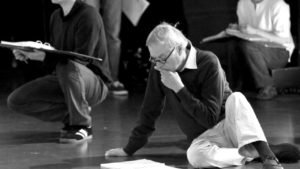
Criticism on Fridays: Hans Neuenfels & The Death That Comes On Its Own
The Death Of The Director Who Always Saw The World Through The Wider Lens Now Leaves Us To Understand His Works
By Polina LyapustinaOn Fridays, Polina Lyapustina delivers a short essay on some of the most essential topics in the industry with the intent of establishing a dialogue about the opera world and its future.
After another shocking performance at the Salzburg Festival in 2001, Gerard Mortier, the famous opera director himself, spoke about the Neuenfels’ production of “Fledermaus” as he summarized his 10 years as general director of the festival:
“I’m personally very happy that I did it. It’s theater as it should be: stirring, provocative and challenging! I believe in the work, it was very important. You have to see that in the classical field you always try to round off the sharpness and the provocation. You forget that even Johann Strauss chose the text as a provocation.”
Indeed, Hans Neuenfels knew how to provoke. And it was never a surprise to hear and see people dissatisfied. He always came on stage after the premiere and received a good round of applause, often mixed with the resentment of the audience. Then he always smiled behind the curtains, and famously shrugged his shoulders “What can I do?”
I’m positive his provocations — the laboratory rats in the chorus of “Lohengrin,” erotic backgrounds in “Così fan tutte,” cleaning lady in “Aida,” or severed heads of Gods in “Idomeneo” will be remembered in the first line. For them, Hans Neuenfels will be referred to and cursed more than once in future decades. But he will be praised for another thing and this, I believe, will remain forever.
No matter, and this moment I emphasize, if I would love and enjoy every production of the director or not, Hans Neuenfels never provoked with no sense. Unlike many of his colleagues and followers, Neuenfels used his ideas and images to make us think deeper. In a world of bright colors and blinking lights, he was searching for the pain points, to return us to meaningful thoughts. And he always succeeded.
He was hitting hard. The outrage was giant. “Write your own damn opera and leave the classics alone,” Lynn René Bayley pointed her opinion on Neuenfels’ “Lohengrin.” But what would this classic be? The Bible stories wrapped in silk and gold? But Jesus came to earth to live a mortal life and suffer with us, so why avoid anything small, dirty, or pathetic on stage, when we talk about such topics?
Who is insulting whom in portraying an Ethiopian slave as a cleaning lady? Why are we looking for an insult in portrayals of slavery, when slavery was a crime and sin! Shouldn’t we look deeper instead, shouldn’t we think harder?
Shock and provocation, step by step, no matter how loud the noise of discontent of the classic picture lovers was, many people accepted what Neuenfels gave them. They came to think with him, maybe with not that much pleasure, maybe with a headache instead, but at the same time, they could get much more from operatic art in this form. To see it as more relevant. Or sometimes, to return to the initial idea of the creator. Back to times when opera houses were the center of social life, where the important decisions were made, where public opinion was made. Could the beauty of classic productions empower operatic art to reach its past glory and authority?
Just recently, I discussed one of my favorite pieces, Monteverdi’s “L’incoronazione di Poppea” which has now become so popular again. And people are always amazed by the passionate story and the beauty of productions. And nobody remembers that Monteverdi wrote it for Venetian society to show (and mock) Rome’s fall into sin and tragedy, knowing full well that everyone in the audience remembers that Nero himself would cut off the life of his pregnant beloved newlywed very soon after the happy ending. But do we know it, do we remember it when we see the beautiful “classic” performances today? And what would we say to the director who’d dare to remind us about these uncomfortable details? We’d say what a cheap provocation! Although, we never address it to Monteverdi…
And when I read about the death of Regietheater Champion, who was also a great writer and thinker who accepted the wonders of life and death equally, I feel a heavenly calmness. The rage is over.
What we can do now, is either reflect on or — for those who often sent Hans Neuenfels [to hell] to write his own opera, forgive and forget.
His works are now history, and belong to eternity. And what I like the most about this fact, is that they live in it so vividly. I believe, they will change their face every decade, as our brain and perception of living in this crazy world will change. What shocked people in “Aida” in 1980 will hardly move us today. And yet, rewatching it, we will be able to see the story through an exceptional lens of the artist, who in his 80 years of life learned and changed himself a lot, but succeeded to remain true to himself, because “What could he do?”


